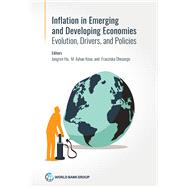Inflation in Emerging and Developing Economies Evolution, Drivers, and Policies
, by Ha, Jongrim; Kose, M. Ayhan; Ohnsorge, Franziska- ISBN: 9781464813757 | 1464813752
- Cover: Paperback
- Copyright: 3/7/2019
This is the first comprehensive study in the context of EMDEs that covers, in one consistent framework, the evolution and global and domestic drivers of inflation, the role of expectations, exchange rate pass-through and policy implications. In addition, the report analyzes inflation and monetary policy related challenges in LICs. The report documents three major findings:
In First, EMDE disinflation over the past four decades was to a significant degree a result of favorable external developments, pointing to the risk of rising EMDE inflation if global inflation were to increase. In particular, the decline in EMDE inflation has been supported by broad-based global disinflation amid rapid international trade and financial integration and the disruption caused by the global financial crisis. While domestic factors continue to be the main drivers of short-term movements in EMDE inflation, the role of global factors has risen by one-half between the 1970s and the 2000s. On average, global shocks, especially oil price swings and global demand shocks have accounted for more than one-quarter of domestic inflation variatio--and more in countries with stronger global linkages and greater reliance on commodity imports. In LICs, global food and energy price shocks accounted for another 12 percent of core inflation variatio--half more than in advanced economies and one-fifth more than in non-LIC EMDEs.
Second, inflation expectations continue to be less well-anchored in EMDEs than in advanced economies, although a move to inflation targeting and better fiscal frameworks has helped strengthen monetary policy credibility. Lower monetary policy credibility and exchange rate flexibility have also been associated with higher pass-through of exchange rate shocks into domestic inflation in the event of global shocks, which have accounted for half of EMDE exchange rate variation.
Third, in part because of poorly anchored inflation expectations, the transmission of global commodity price shocks to domestic LIC inflation (combined with unintended consequences of other government policies) can have material implications for poverty: the global food price spikes in 2010-11 tipped roughly 8 million people into poverty.







